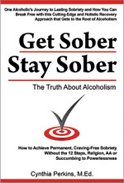Sugar and Alcoholism
The connection between sugar and alcoholism is complex and multi-faceted. If there is nothing else the alcohol addicted individual does in regard to addressing the biochemical issues that are presented on this website, the most important step you can take is removing the other "white stuff" from your diet.
Even if you follow none of the other steps I've presented, you can significantly increase your chances for long-term sobriety and make drastic improvements in your mental health with the removal of sugar alone. As a matter of fact, the impact of sugar on the brain is so profound and similar to alcohol, that if it is not removed from the diet, it almost guarantees that relapse will occur. The consumption of sugar is one of the primary reasons that most alcoholics in recovery fight constant cravings for alcohol and struggle to remain sober.
Sugar is not a food - it is a mind-altering and addictive drug.
Recent research suggests that it is more addictive than cocaine, one of the most addictive substances on the planet. When lab rats were given the choice of sugar water over cocaine, 94 percent of them chose sugar water over cocaine. Even rats that were previously addicted to cocaine would switch over to sugar water when they were given the choice.
The molecular structure of refined white sugar is almost identical to alcohol and dramatically alters brain chemistry in the same way as harder addictive substances. In other words, alcohol and sugar have a very similar impact on the neurotransmitters in the brain associated with addiction.
Just like cocaine and opium, sugar is a natural substance that has been refined to intentionally maximize its chemical surface area and biological activity. Cocaine is refined from coca leaves, opium is refined from poppy seeds and white sugar is refined from cane sugar.
We can label sugar as an addictive mind-altering substance on the following grounds:
- It is consumed compulsively regardless of negative consequences.
- Neurotransmitters in the brain are affected in a similar manner as alcohol and hard drugs.
- Tolerance develops and higher levels of sugar are needed to achieve the same experience.
- With continued use, sugar is needed to function normally.
- Withdrawal occurs when sugar is eliminated from the diet.
When you eat refined white sugar, simple carbohydrates and even the wrong type of complex carbohydrates, it triggers a very intense and large supply of dopamine, serotonin, GABA and endorphins into the brain all at once and we feel great -— kind of "high". High levels of these neurotransmitters results in a euphoric sense of well-being and inner peace, known as "being high."
Once the sugar is processed, our neurotransmitters crash to very low levels, which makes us feel bad, lethargic, depressed or very "low." We then crave more sugar to bring us back up or to feel high. This is also true of other highly refined and processed foods found in the average diet today, such as white flour, artificial flavorings, dyes, additives, etc.
The more often you engage in this vicious cycle, the more sugar you will need to achieve the same high, because when neurotransmitters are overstimulated then the brain reduces receptors, which results in tolerance and eventually you'll no longer be able to feel normal, happy, relaxed and enjoy pleasure unless you eat sugar.
This is very important, because this is the exact same thing that happens to the brain in the addiction process to alcohol or drugs. Just like drugs and alcohol, sugar excessively stimulates neurotransmitters in the brain. Excessive or artificial stimulation of neurotransmitters leads to depletion, tolerance and then dependence on the substance to replace the depleted neurotransmitter. For a recovering alcoholic or drug addict, this usually leads to cravings for alcohol and/or drugs, and most often results in relapse. For the sugar addict, it is cravings for sugar and carbohydrates.
Due to the preceding facts, this means that sugar addiction is often a gateway to alcoholism and addiction to other harder substances, and if the alcoholic or drug addict in recovery continues to consume sugar, they are at risk of ongoing relapse.
Most alcoholics are addicted to sugar before they are addicted to alcohol. We become addicted to sugar in childhood and then because of the process of tolerance it progresses onto other things like caffeine, nicotine, alcohol, marijuana, cocaine and so on and so on. However, the true addiction is to sugar, and once the alcoholic becomes sober, they return to the original source and once again crave sugar.
I remember very clearly being a sugar addict as a child. I used to hide hoards of candy, cookies, etc., in my bedroom to savor all by myself. One of my favorites was Blackjacks and when I would run across the street to pick up some bread and milk for the family, I would sneak a bag of Blackjacks in the mix and hide it in my room. I had four brothers and sisters and it was often hard to get the amount of sugar I wanted because they would eat it, so I would stash mine away.
We had a little store downtown that had a whole isle of penny candy. I used to collect all the change I could find in the cushions of the couch, sneak down to the store, and get as much candy as I possibly could and hide it in my room to eat when I was alone. I was in pure heaven with a bag of Fireballs to suck on. I would also make batches of no bake oatmeal cookies when my parents weren’t home and then hide the whole batch in my room and wash the dishes up very quickly, so no one would know I made them.
I was sneaking around like an alcoholic hiding my cookies and candy. If you look back on your life, you’ll probably remember some similar incidents; and if you look around any AA meeting, you can clearly see addiction to sugar, as well as caffeine and nicotine, are going strong.
Furthermore, alcohol is a sugar that doesn't have to be digested to get into the bloodstream. It is absorbed very quickly through the stomach wall. Therefore, alcohol = sugar. Sugar in the form of alcohol gives the body what it craves instantly in a much more potent format and, thus, incites the cycle of addiction to the alcohol.
For the alcohol addicted, these two substances are interchangeable. Thus, why all alcoholics who have not done biochemical repair are addicted to sugar in recovery. They replace alcohol with sugar. When an alcoholic craves a drink, it really isn't alcohol they are craving at all. It is the sugar. The alcohol just works as a catalyst to provide a quick fix.
Since sugar and alcohol are essentially sisters biochemically, when you continue to eat sugar in recovery, it can make you crave alcohol. When your body and mind are screaming for an alcoholic beverage, what it's really craving is sugar. The body of an alcoholic has grown accustomed to receiving its sugar in a much more intense and faster route -- through the alcohol. When you drink alcohol, it is very quickly absorbed through the intestinal wall. When you take the alcohol out of the picture, you crave sugar. When you eat sugar in cookies, candy bars, doughnuts, etc., it relieves some of your symptoms, but it doesn't give you the same intensity or bring you as high as it does with alcohol, therefore, the consumption of sugar leads to cravings for an alcoholic drink.
Additionally, sugar is void of any nutritional value and it must pull from your reserve of nutrients in order to be metabolized, which leads to nutritional deficiencies and, consequently, more neurotransmitter depletion. Neurotransmitters are formed from nutrients in our food, if nutrients are low, then neurotransmitters cannot be produced, which also perpetuates the addiction cycle.
Not only that, the consumption of sugar also perpetuates hypoglycemia and Candida yeast overgrowth, two conditions that commonly occur with alcoholism, that can also result in relapse if they are not addressed.
It is equally important to be aware that if you are consuming caffeine and/or using nicotine, that both caffeine and nicotine increase sugar levels in the bloodstream. Each time nicotine or caffeine enters the body, they stimulate the liver to release the sugar it has stored in the form of glycogen into the bloodstream. So, if your using nicotine or consuming caffeine, then it is as if you are eating sugar. Both of these must be eliminated as well to reduce sugar levels in the body and overcome cravings for alcohol and or other addictive substances.
This is also true of stress. When we are under stress, we need a lot of energy, so the liver will release its glycogen. Therefore, managing your stress is essential for regulating the levels of sugar in your bloodstream.
In order to stop cravings for alcohol and allow neurotransmitters to normalize, the alcoholic must remove sugar from their diet completely and keep it out. I can share with you that this piece of information was what literally made my recovery. Once I removed sugar, caffeine and nicotine from my diet, I never had a craving for alcohol, marijuana, benzos, or any other drug again.
You can learn more about sugar, the diet needed for sobriety, hypoglycemia, Candida yeast, neurotransmitters, nicotine, caffeine and all the other factors that need to be addressed to help you achieve life-long and craving-free sobriety in my self-help program, Clean and Sober for Life Jump-Start Program.
Understanding the intimate relationship between sugar and alcoholism and taking the appropriate steps can be the determining factor on whether you remain sober or not.
Additionally, all that we have discussed here is true for addiction to other drugs as well. Since sugar is a drug, it can incite cravings for opiods, marijuana, cocaine etc. In order to overcome an addiction, one must eliminate all addictive substances or they lead back to the substance of choice.
References
Adams, Mike. “Sugar Addicts.” Natural News.com, 2006. http://www.naturalnews.com/020795.html
Merola.com. “Is Sugar More Addictive than Cocaine?” http://articles.mercola.com/sites/articles/archive/2007/08/06/is-sugar-more-addictive-than-cocaine.aspx
Norwood, Robin. Women Who Love Too Much. Pocket, 1990.


